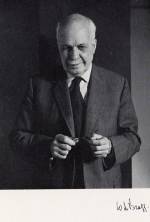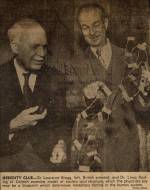| Sir William Lawrence Bragg |
|
Pauling's only real competitor in the field of discovering the structure of complex
molecules was Sir William Lawrence Bragg, English Nobel laureate and leader of the
laboratory in which Watson and Crick toiled. Bragg and Pauling had competed for scientific
priority several times since the late 1920s, when they vied to be the first to publish
the structures of large inorganic molecules like silicates (Pauling took the prize);
and again for the structure of basic protein components (Pauling won again in 1951).
Their competition was low-key and polite, but pointed.
Bragg was a quiet man. He had won his Nobel Prize at a very early age for work with
his father on x-ray crystallography. He was head of one of Britain's leading laboratories,
the Cavendish at Cambridge. He had little to prove. But he, like Pauling, had become
fascinated with the molecular structures of large biomolecules, and had a large, well-equipped
team working on proteins, including the eminent researchers Max Perutz and John Kendrew
(in whose laboratory Watson, Crick and Peter Pauling worked). They had all been galled
when Pauling beat them to the alpha helix. Bragg was weary of coming in second.
|
|
Click images to enlarge

Portrait of Sir William Lawrence Bragg, approx. 1960.

"British Scientist Here Tells of Heredity Study." September 30, 1953.
"And, as I recount in The Double Helix, I thought Bragg was just a stuffy old man when I met him. But he was a fine man.
He had a really keen interest in science, and he was certainly Francis's only competition
at the time, in the sense that he was a theoretician. And he had a difficult time,
because most people thought that it was his father who had been the clever one, whereas
it was the younger Bragg who'd made the running."
|

